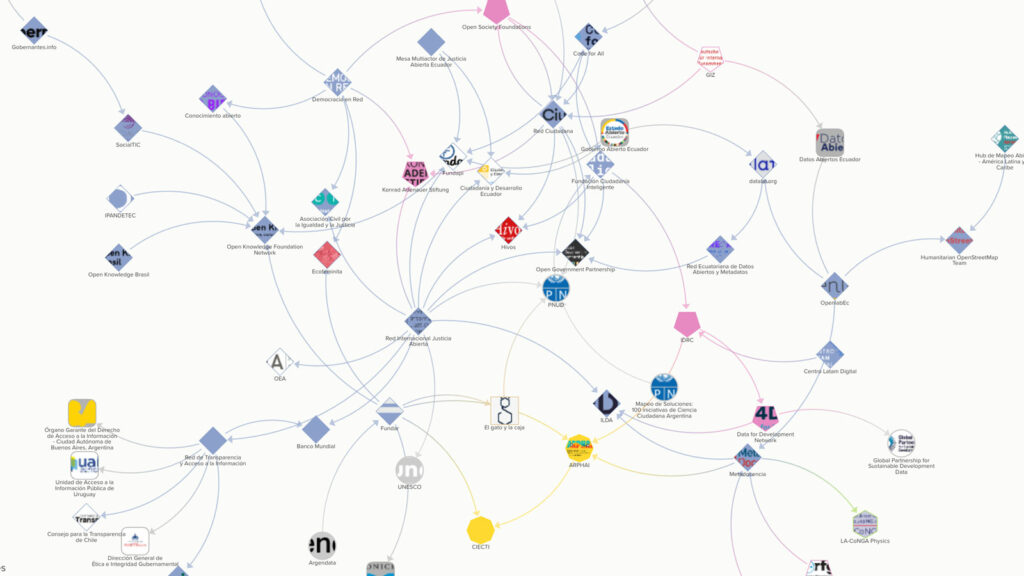This past October 14th we had the Latin America regional call, where we met with regional members of the Open Knowledge Network to share a relaxed and focused talk about our needs, and to present the map of communities we have been working on these last few months.
The meeting was attended by a group of members of the Network from Latin American: Sandy Palacios (Mexico), Fernanda Carles (Paraguay), Eduardo Bejar (Ecuador), Haydee Svab (Brazil), José Luis Mendoza Marquez (Venezuela), Julio Herrera (Guatemala), Adrián Pino (Argentina), and Julieta Millan (Argentina) as regional coordinator. We wanted the conversation to be as natural as possible so, although the call was open to the entire community, we decided to do it in Spanish.
Presentation of the map

When the prototype regional hubs programme was launched, we were given the task of mapping the state of open knowledge in our region. As expected, each coordinator approached the task in the way they found most useful for their particular situation. For Latin America, we decided to focus on communities and organisations working with open knowledge, and how they relate to each other. We were mainly inspired by Jo Haverman’s map on open science, available at Open Science • Workflow / by OS principle • Kumu. This is how the first version of the map was born and, in this meeting, we talked about its usefulness and points of improvement (for other examples of similar maps, Esther Plomp, coordinator of Europe, compiled a few very interesting cases in this blog).
First impressions
The general impressions of the map were very good. We emphasised the importance of easily accessing information that may be difficult to obtain in other ways, as well as being able to quickly find out who is working on certain topics and where they are located. If we want to find strategic allies, strengthen networks, learn about experiences or form alliances for new projects, this information is key.
We briefly discussed the mapping process itself, to understand the sources of the information reflected on the map. In this first version, we assembled the database by accessing, one by one, the web pages of each organisation and looking for information on other partner organisations or funders. Undoubtedly, this can lead to confusion or outdated information, so having the support of members for each group is very important to notice errors and correct them.
In addition, it would be interesting to add other types of nodes, such as events (AbreLatam, América Abierta, etc.) and projects, and to think about how to include in the map people working individually within larger organisations, or how to add global organisations with many chapters in different countries, such as R-Ladies or Scielo. On the other hand, we agreed that it is important to add more categories to the thematic work (e.g., adding climate change).
Collaboration
One of the biggest uncertainties, which we have not yet been able to answer, is what is the best way to keep the map updated without the task falling on a single person; certainly, there should always be someone in charge of curating the information, but it would be ideal if any interested member of the public could propose a modification or the inclusion of a new node. We considered several options, such as a form, using Wikidata, or even a GitHub repository with tables for each organisation. Defining a simple mechanism, both for the community and curators, is key so that the map remains useful. From this conversation we proposed to organise work tables, where we have more time to try to solve some of these problems.
Communication
After the map review, we moved on to a more general conversation about the relationship with the Network and how we think we could better leverage it in our region.
While all of the topics discussed at OKFN global meetings are interesting, they often feel too far away (in every sense) for our region and local needs. We discussed the possibility of planning regular, probably monthly, OKFN meetings specific to Latin America that address issues that affect us more directly, and other types of global meetings focused on specific work topics. We commented that it would be important to provide a better induction to OKFN topics, the Network and the technical tools we work on. In addition, we believe it would be interesting to find a more accessible asynchronous means of communication than the current one (Matrix) to be able to share resources and have dynamic conversations that are not limited to monthly calls.
What is clear is that everyone who participated in the call is interested in maintaining active communication to strengthen ties and facilitate the collaboration of the Network in Latin America.
If you are interested in collaborating, adding or correcting a node on the map, or have an idea to facilitate the participation of the community, you can write to us at network@okfn.org.








